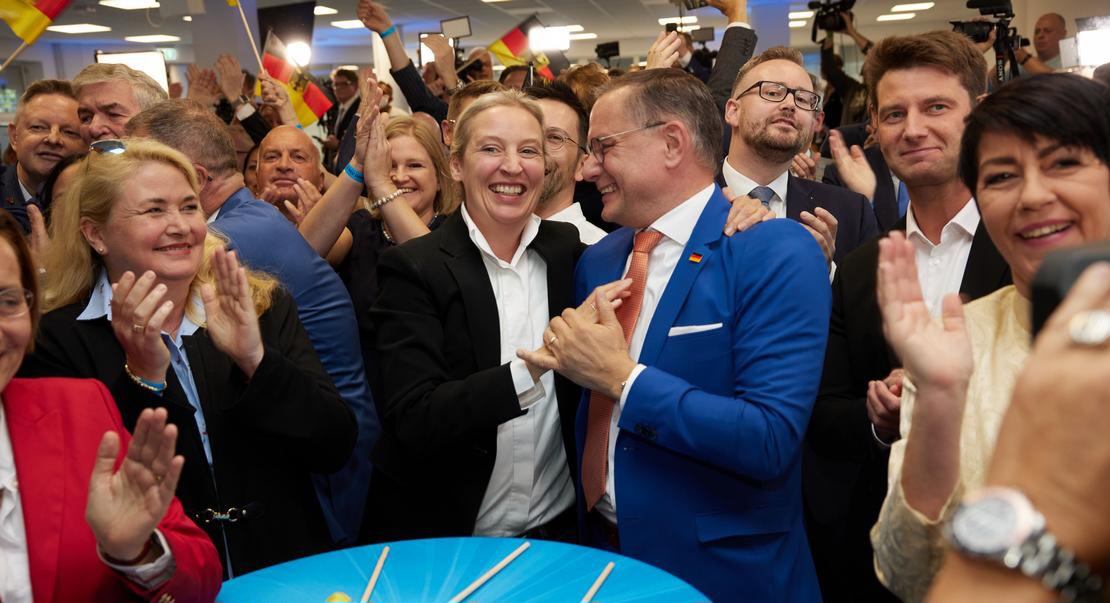Berlin, June 10, 2024, The Europe Today: In a night marked by significant political shifts, the European elections saw far-right parties in France and Germany make dramatic gains, yet fail to topple the centrist working majority in the European Parliament. This outcome ensures Ursula von der Leyen remains on track to serve as European Commission President until 2029.
“We won the European elections. We are by far the strongest party. We are the anchor of stability,” declared the German conservative to journalists at the European Parliament in Brussels as projections were announced. “The center is holding.”
The center-right European People’s Party (EPP) group emerged with 184 of the 720 seats, according to provisional projections from all 27 EU countries. The center-left Socialists and Democrats (S&D) group followed with 139 seats, and the liberal Renew group secured 80 seats, both slightly weakened but essential to von der Leyen’s continued leadership.
“We will build a bastion against the extremes from the left and from the right,” 65-year-old von der Leyen told EPP supporters, indicating her intention to collaborate with the center-left and liberal groups to advance her agenda.
Despite expectations of a far-right surge, the impressive individual results for France’s National Rally (RN), the Freedom Party of Austria (FPÖ), and Germany’s Alternative for Germany (AfD) did not result in a substantial reshaping of the EU’s political landscape. However, the increased presence of far-right members in the legislature signals that their influence cannot be ignored.
One of the night’s biggest surprises came from Paris, where President Emmanuel Macron announced a snap parliamentary election before the final results were confirmed. His centrist pro-European party Renaissance garnered only 15% of the vote, overshadowed by the far-right National Rally, which captured over 30% of the French votes.
“I’ve decided to give you back the choice of our parliamentary future through the vote. I am therefore dissolving the National Assembly,” Macron announced in a national address. “Far-right parties … are progressing everywhere on the continent. It is a situation to which I cannot resign myself.”
Macron’s decision is a significant gamble as he attempts to regain control of the country. French voters will return to the polls on June 30 and July 7, just weeks before the Paris Olympics. While Macron’s position as president remains secure following his 2022 re-election, this move underscores the growing challenge posed by the far-right.
Marine Le Pen, leader of the National Rally, welcomed Macron’s announcement. “We are ready to exercise power if the French give us their trust in these elections,” she stated. “We’re ready to transform the country, to defend the interests of the French, to stop mass migration.” Le Pen is anticipated to contest the 2027 presidential elections, although the National Rally is currently led by 28-year-old MEP Jordan Bardella.
The far-right parliamentary groups, the national-conservative ECR and the far-right ID, saw modest increases, securing a projected 71 and 58 seats, respectively. Additionally, Germany’s AfD, despite a series of scandals, emerged as the second largest force in Germany with a projected 14 seats.
The AfD, however, remains politically isolated in Brussels. The party was expelled from the ID group last month following allegations against its lead candidate, Maximilian Krah, concerning Russian influence, espionage for China, and controversial remarks about Nazi SS troops.
The potential for the far-right factions to form a broad coalition and amplify their influence will be a key focus in the coming weeks. Analyst Pawel Zerka of the European Council on Foreign Relations (ECFR) noted, “The biggest winners of this election are the two families of the radical right. Collectively, including non-affiliated parties like the AfD and [Hungarian] Fidesz, they seem close to surpassing the one-third seat threshold, enabling them to obstruct EP legislation.”
Italian Prime Minister Giorgia Meloni and her Brothers of Italy party, along with Austria’s FPÖ and Poland’s Law and Justice (PiS) party, also made notable gains. However, Polish ex-Prime Minister Mateusz Morawiecki stated his party would not support von der Leyen’s bid for re-election as European Commission President under current circumstances.
As the political landscape continues to evolve, the balance between centrist stability and far-right momentum will be critical in shaping the future of the European Union.


